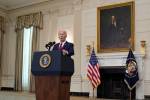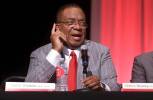Gibbons greeted with catcalls at UNLV commencement


He may be the state’s top official, but Gov. Jim Gibbons is not the big man on campus these days.
At the UNLV commencement Friday, the Republican governor, whose proposed budget cuts are causing consternation in all quarters of state government, was roundly booed.
In a video recording of the event, Gibbons, clad in a white robe with black stripes on the sleeves, stands with a frozen grin while the university’s president, David Ashley, introduces him.
"We are indeed privileged today to have the governor of the state of Nevada, Jim Gibbons, joining us on the platform," Ashley says, as boos and comments like "Get out of here!" amply drown out the scattered polite applause.
Ashley then gives Gibbons a rather passive-aggressive welcome: "Governor Gibbons," he says, "both Chancellor Jim Rogers and Regent Chair Mike Wixom join me in expressing our sincere appreciation for giving the Nevada System of Higher Education the opportunity to explain our financial situation, for your understanding of the potential impacts of the significant cuts, and for continuing to support the Nevada System of Higher Education."
Whether Gibbons has done all the things he was thanked for is a matter of debate. Rogers in particular has railed, in his typical no-minced-words style, against Gibbons’ attempts to cut the university system’s budget.
OLDIES STATIONED
If AARP members are any indication, most Nevadans of both parties are up for grabs when it comes to next month’s presidential caucuses.
The organization for people over 50 polled about 500 members who said they were likely to attend the Jan. 19 caucuses. Majorities of both — 58 percent of Democrats surveyed and 76 percent of Republicans — said they were either very likely or somewhat likely to change candidate preference.
There’s no way to know how big a voting bloc its members will be in the caucuses, but AARP has been very active in educating and encouraging its members to participate. There’s no precedent in Nevada, but caucus-goers tend to be older than the general population in Iowa.
Of AARP’s 327,000 members in Nevada, about a third are Democrats, a third Republicans and a third unaffiliated.
Not a lot of deciding has gone on in the last five months, it seems. The number of changeable Democrats has declined 12 percentage points from when AARP conducted the same survey in July, while the percentage of Republicans who think they’ll change their minds has declined just 6 points.
"Nevadans of both parties are studying the race leading up to our Jan. 19 caucus closely," said Barry Gold, manager of the Nevada Divided We Fail effort, a campaign to draw attention to health care and retirement issues. "They are concerned about the direction of the country and are aware that this election will make a difference."
Eighty to 90 percent of those surveyed said health care and retirement would be important in deciding their vote. Among both parties, the percentage calling Iraq the most important issue has declined since July; it is still the most important issue to Democrats, cited by 29 percent, but has been eclipsed by immigration as the top issue among Republicans. Twenty-six percent of Republicans now say immigration is the most important issue facing the country, while 12 percent cite Iraq.
Asked whether the candidates have addressed the issue of retirement security, Republicans rated Mitt Romney and Rudy Giuliani highest, with 47 percent and 46 percent, respectively. Romney was the clear winner on health care, with 51 percent saying they believed he would address the issue very well or somewhat well.
Among Democrats, Hillary Clinton ran away with both categories, with 64 percent saying she’s addressed retirement and 82 percent saying she’s addressed health care. But Barack Obama and John Edwards scored respectably.
The poll was conducted by Woelfel Research Inc. and has a margin of error of plus or minus 4.4 percentage points.
REID-Y VOICES
Sen. Harry Reid has blown hot and cold with online liberals since he ascended to the Senate leadership. This year is ending on a cold note.
An item last Wednesday on the Huffington Post, a widely read liberal blog, floated Sen. Chris Dodd of Connecticut as a possible challenger to the majority leader from Nevada.
"Almost all of the support for this effort now comes from the netroots," Sam Stein wrote.
"Netroots" are the political activists organized through blogs and other online media.
The progressives, a Democrat-courted constituency, said Reid wasn’t tough enough at the end of a year where the party leading Congress got mixed reviews at best and bad reviews from the anti-war crowd for failing to bring troops home. By contrast, liberals were taken with a Dodd performance in the final days of the session.
The Connecticut senator took to the Senate floor and threatened to filibuster a bill that would have granted immunity to telecommunications companies that participated in the Bush administration’s warrantless surveillance program. The bill was pulled.
"It’s clear that we live in a climate in which the type of leadership we need is better provided by Chris Dodd," Markos Moulitsas, another leading liberal blogger, told the Huffington Post. "Republicans have been laughing at us all term."
Dodd, who is in Iowa, is focused on his campaign running for the Democratic presidential nomination, a spokeswoman told the blog.
Reid had no comment An aide minimized the write-up.
"It’s a posting on a blog," Reid spokesman Jon Summers said. "It is other senators who determine who the leader is, and Senator Reid has the full support of his caucus."
Dodd ran for Senate minority leader in 1994 and lost to Tom Daschle of South Dakota. In 2004, Dodd thought again of running for Democratic leader but decided not to after Reid moved quickly to claim votes.
The progressive netroots have long had a love-hate relationship with Reid. In June 2006, they cheered when he addressed the inaugural Yearly Kos convention in Las Vegas. He entered to the riffs of "Street Fighting Man."
"Senator Reid doesn’t just have his finger on the pulse of American politics … in many ways he is the pulse of American politics," the Daily Kos Web site proclaimed in January 2006.
But as Democrats were unable to force an end to the Iraq war this year, the liberals turned on Reid. They sent him tea bags as a mocking gesture when the Senate in May passed an Iraq funding bill without a troop withdrawal deadline.
Michael Green, a history professor at the College of Southern Nevada who describes his personal politics as liberal, said the bloggers have unrealistic expectations.
"A lot of the people who are most upset with Reid have no conception of how the Senate works or doesn’t work," Green said. "They want Reid and (House Speaker Nancy) Pelosi to end the war just by snapping their fingers."
Eric Herzik, a professor at the University of Nevada, Reno, agreed, saying Dodd would be no more able than Reid to end the war.
Liberal disenchantment could even be a good thing for Reid in Nevada, where polls have shown his popularity and job approval ratings have dipped to around 30 percent, Herzik said.
"Harry Reid’s numbers have dropped in part because he is perceived as more liberal and out of touch," Herzik said. "The way to fix that is to be attacked by the left."
Contact reporter Molly Ball at mball@ reviewjournal.com or (702) 387-2919.
VIDEOGibbons booed


















